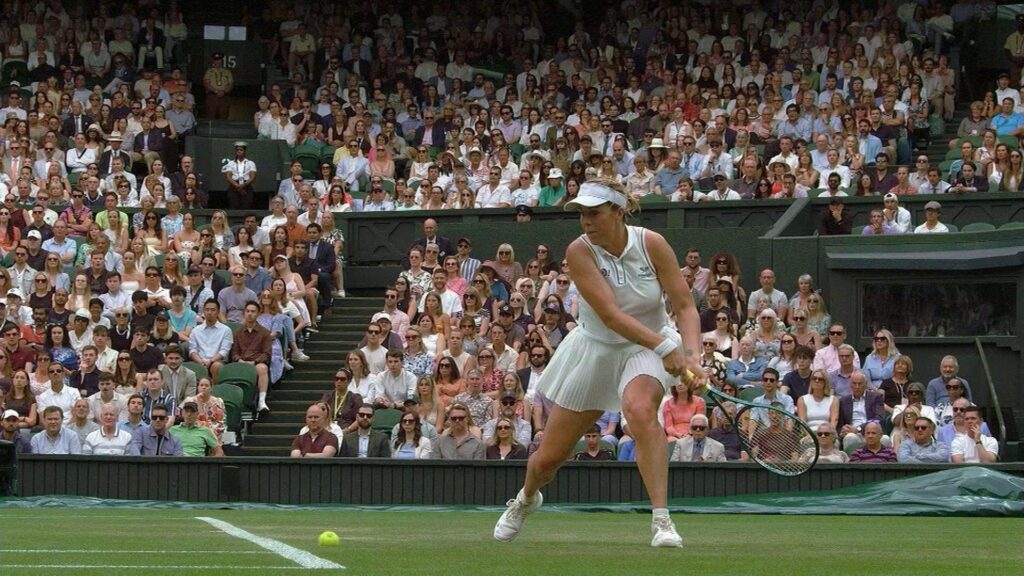In a notable incident during the 2025 Wimbledon Championships, Russian tennis player Anastasia Pavlyuchenkova expressed her vehement discontent regarding the malfunction of the tournament’s electronic line-calling system. This system failed during her intense fourth-round match against Britain’s Sonay Kartal, leading Pavlyuchenkova to assert that “they stole the game” from her as a result of this error. This critical moment occurred when a backhand from Kartal was called in—despite replays confirming that the ball had actually gone long, and thus out, during play. The incident played out dramatically, showcasing the challenges that can arise with reliance on technology in high-stakes matches.
The incident came to a head when the officiating chair umpire, Nico Helwerth, halted the match at a crucial moment when the score was tied at 4-4 in the first set. His directive to stop play came as it became evident that there was no call made by the electronic system regarding the crucial point in question. After consulting with officials via telephone, Helwerth revealed that the system had failed to track the point properly. Consequently, the controversial point was replayed, which Kartal proceeded to win. This turn of events resulted in Kartal gaining a 5-4 lead in a match that Pavlyuchenkova felt fundamentally impacted her gameplay.
Pavlyuchenkova’s frustration was palpable as she confronted Helwerth at a changeover, questioning the process and accountability involved in the error. She was recorded protesting the inaccuracies, saying, “I don’t know if it’s in or out. How do I know? How can you prove it?” Furthermore, she passionately declared, “They took the game away from me.” The emotional weight of her statements underscored the high tensions often present in elite-level sports, where every point can influence match outcomes.
In response to the uproar, the All England Club issued a statement explaining that the line-calling malfunction occurred due to operator error. The club asserted that the chair umpire had followed the established protocols during the incident, yet the fallout from this malfunction stirred wider discussions regarding the reliability of electronic systems introduced for improving accuracy in officiating, particularly at a venerable tournament such as Wimbledon. The electronic line-calling technology, first implemented at the tournament in 2025, has been met with skepticism by several players throughout the event, including criticisms regarding its perceived inaccuracies.
This failure also caught the attention of multiple players on the tour, including Emma Raducanu, who had openly criticized some line calls as “dodgy,” and Belinda Bencic, who noted that the topic stirred significant debate amongst players in the locker room. Such concerns highlight an ongoing discourse about the balance between technology and human judgment in sports. While innovative technologies have replaced traditional line judges in various competitions—like the US Open and Australian Open—this incident illustrated the challenges still faced concerning reliability and player trust.
The incident raised crucial questions about the process used when technology fails. Current rules dictate that there are no challenges available under the electronic calling system, and players cannot utilize video replays during such failures, prompting calls for a reassessment of these regulations. Players like men’s fifth seed Taylor Fritz suggested that judgment calls should revert to umpires whenever there is technological failure, restoring a measure of human oversight to address discrepancies.
Billie Jean King Cup captain Anne Keothavong highlighted the need for reflection on improving the technology’s reliability, asserting that “uncertainty creates anxiety” among players. The call for changes was echoed by former world champion Tracy Austin, who framed the incident as a unique event that could pave the way for future improvements. In light of this incident on the grand stage of Centre Court, it became clear that the dialogue surrounding technology in sports is ongoing, requiring adaptive solutions and enhancements to ensure that the spirit of fair play and accountability prevails in high-level competitions.











